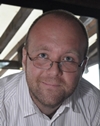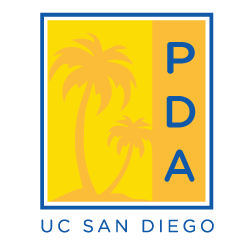
Dimitrije Krstic, Ph.D.

- Interview Overview
Interview Overview
Interviews by: Davide Povero
Editing: Jamie Joseph
1. Please list your previous department at UC San Diego and provide a brief description of the research you conducted?
I was a postdoc in the lab of Prof. Larry Goldstein in the Department of Cellular and Molecular Medicine at UCSD. During my postdoc, I aimed to test a provocative new hypothesis of how Alzheimer ’s disease might develop. Our hypothesis was that dementia is caused by neuronal exposure to various chronic stressors in the brain (e.g. chronic inflammation, oxidative stress, low glucose metabolism, brain injury or infection...) in the non-genetic form of Alzheimer’s disease. As consequence of these stressors, hyper-production of Amyloid Precursor Protein would occur leading to amyloid plaque formation.
2. Please describe your current job profile?
I work as a freelancer, helping both individuals (scientists, researchers) and scientific groups to develop soft and transferable skills (e.g. communication skills) and develop powerful research teams using the full potential of team members. The golden goal is to accelerate superb science while helping individuals in their career advancements in Academia or outside of it.
While industry figured out (look at Genentech) the importance of proper human resource development and management for increasing productivity and performance, the Academic system has mostly stayed oblivious to this issue when referring to PhDs and postdocs. This is partly because of traditional scientific and managerial freedom given to PIs and professors, who do not have appropriate managerial education. Or in other words, being a great scientist and well recognized expert does not automatically qualify you to be a great group leader or a project/finance manager, or even a lecturer and examiner. My current aim, and the aim of my organization Pimp Your Science, is to show fellow scientists to the importance and implications of these issues for academic Science and their careers.
3. What made you decide to transition into your current position?
As many PhDs and postdocs, I also entered the scientific arena with a pure enthusiasm of discovering how the Nature works. For most of my career, my primary concern was having the right controls and avoiding spelling errors in manuscripts I was writing. I was assured by my supervisors, that the excellent science will be always recognized and rewarded (I would say this is a rather utopian view of science.). Anyway, being in my second postdoc, I started thinking about what to do next... and except becoming a “Professor at University” I had no idea what else would I like to do. Actually, after being in an Academic environment for 15 years, I was not even sure a life outside Academia is a life worth living :-). Anyway, since I realized that only 1 in 10 postdocs in US get the tenured prof. position, I realized that I need to have a plan B. Hence, I looked to see what others were doing - a “sheep method” as one of my good colleagues said to me- and being in USA I started an MBA program. I learned during my MBA that I hate Accounting. However, I found myself emerged in subjects which tackle psychology of work and managing people. It was a “why-didn’t-anyone-tell-me-this-before-effect” for this new knowledge that encouraged me to take a quite different step in my career and start my own business -“preaching” things I have learned to others.
4. Apart from the research you conducted, do you feel like anything in particular has helped you to acquire your current position?
It was mostly a combination of my work experience and acquired insights into Human Resource Management theories, as well as my outgoing nature and desire to disseminate knowledge that primarily influenced my decision to leave the lab setting and start my own organization. However, it was the exposure to American, or better said Californian, entrepreneurial culture and open-minded view on life -to which I was exposed during my stay at UCSD- that was the decisive drop in a full glass which helped me to make such a decision. I would also like to mention that my mentor, Larry Goldstein, indirectly facilitated the transition, since he was a perfect role-model of how you can improve and accelerate progress in Science by being engaged in research unrelated but Science relevant work.
5. Please list some of the most striking similarities and differences between your post-doc and current position?
For better or worse – having your own business or running an organization is a quite different from “postdocking”. You learn to plan yourself and to prioritize tasks, otherwise you “waste the whole day”. You become more efficient and go only for most effective solutions. You become involved in more than two projects, usually not related. But, you do all this with “ease” and enthusiasm. Finally, you see the sky as a limit of your creativity... Wait... this sounds as if I am describing a postdoc position in Academia! Well if you are a postdoc and you can identify with the description above, than you are probably on the right path and should discard this interview, otherwise you should start thinking about a plan B.
The biggest difference is of course that you are now in the open market. The great thing about this is that you don’t care anymore what a grant reviewer (a competitor) thinks about your project (product or service). The quality and and not an opinion will decide what’s good and what not (think about Nature’s comment on PLoS ONE publishing model few years back). You also don’t work to please or impress the third reviewer but your product users, which is a quite different attitude to Quality Management. However, although you may not care what your competitors think about your work, you are still faced with a challenge how to differentiate your product or service from existing ones. What is the novelty you are bringing to the market? How good you are and how well can you sell your business will ultimately determine your paycheck at the end of the month. However, postdocking pays your bills even if your experiment failed or the working hypothesis is not holding against experimental evidence, or you have just received a manuscript rejection from Nature or PloS One.
6. Is there any specific challenge (during the entire process of transitioning) that you would like to highlight and if so how did you overcome it?
I am still in transition, so I cannot definitively answer this question, but I did have a fear of unknown. I was used to University system and actually had no clue how the “outside world” works. Once you leave the lab, all of a sudden soft skills are much more important as well as how you develop your network. Having 200+ connections on LinkedIn isn’t enough anymore. Pimp Your Science will try to emphasize such issues and at least make you aware that for example most people use only 10-20% of LinkedIn “power”. Anyway, for me, going from the status “expert in a research field” to a “rookie in a new field” was and still is a bit demotivating or discouraging, but many psychologist say this is a normal part during a career transition, and I am just getting out of it... My tip to all, regardless of where are you in your career or life is to just do YOGA and everything is going to be OK. I trained in martial arts, was going swimming regularly, and did Pilates in different parts of my life, but Yoga (my wife actually pushed me to it) changed my attitude toward life - which can be shortened to a simple sentence “don’t worry, and just do the dam Asana”. Never in my life did I feel such an energy boost and peaceful mind after doing sports as with Yoga. So, now I do it at 6am for an hour and work the whole day with superb concentration.
7. Please describe your goals and ambitions for the next 5 years?
Well first goal is to lead Pimp Your Science organization across the death valley of start-ups. The ultimate goal of PYSci is to start educating Science PhDs how to become personal HR coaches or strategic lab managers to Life Science research groups, work at Universities as Human Resource Management & Development specialists and/or soft-skill trainers. Through my MBA I figured out it is easier to make a Life Science HR specialist from a PhD holder than from the MBA holder. So, there is a bright future for those science PhDs ready for psychology and sociology classes. Until then raising general awareness that a properly developed and managed research teams and strong soft skills are indispensable for academic career progression is the top priority of PYSci. Well the second is to finish my Master’s studies in Human Resource Management and let the future bring new challenges and opportunities.
8. What do you feel you could have done more, as a postdoc, to help prepare you for or acquire your current position?
With the knowledge I have now, sure I would change many things e.g. went out more to career fairs, networking events, used every opportunity to communicate my work to general public (neighbors, associations...). I would not rely on career advices only of my supervisors but also from others working outside of Academia. And for all those that have entrepreneurial soul, no matter if you will or will not start your own gig, get more info on how business world runs. In general, getting out of the lab to work on your career (both in and outside Academia) should be your obligatory weekly task.
But perhaps the most important change I would make is: instead having the attitude “Look what I have published” or “Let me tell you what I found” or “How great am I?” I would practice to be more of a “How can I help you?”- mentality. It does make a big difference in the way people look at you and ultimately your work, whatever it is.
9. What do you feel is the most important advice you can give to a current UCSD postdoc in order for them to obtain a position such as yours?
Well I was trained for 15 years to be a rational person that takes decisions and makes conclusions based on evidence and logical thinking, yet I started my PYSci adventure based on a gut feeling after reading a single MBA textbook - Organizational Behavior by Prof. R Dailey. How silly of me... but I am enjoying the rough ride and am looking forward to new adventures. Hence, if I am a right person to give any advice, I would say once you start thinking about a new job, career, life... listen to your gut feeling... or look at the Jim Carrey movie “Yes Man”. It worked for me…
